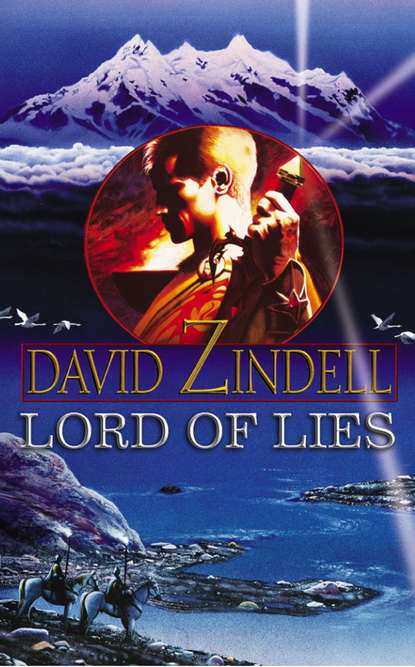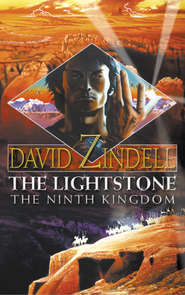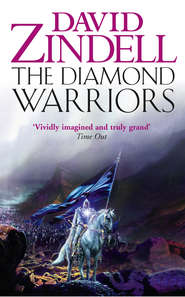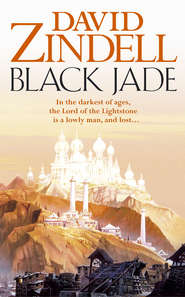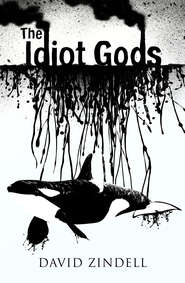По всем вопросам обращайтесь на: info@litportal.ru
(©) 2003-2024.
✖
Lord of Lies
Автор
Год написания книги
2019
Настройки чтения
Размер шрифта
Высота строк
Поля
My father’s face was grave as he said, ‘Where is safety to be found in this world? Wasn’t it only last year, at King Kiritan’s birthday celebration, that one of his own barons nearly assassinated him?’
‘Baron Narcavage, as you must know,’ Count Dario said, glancing at the priests at table next to him, ‘had gone over to Morjin. The plot was crushed – you can be sure that my king’s other nobles remain loyal to him.’
‘That is good. There’s little enough of surety in this world, either.’
Count Dario’s cool blue eyes tried to hold the brilliance of my father’s gaze as he said, ‘Come, King Shamesh, what do you say as to my king’s request?’
‘That it is not mine, alone, to grant.’
‘No? Whose is it, then?’
My father shifted about in his chair to regard the Lightstone for a long few moments. He bowed his head to the Guardians who protected it. Then he turned back to Count Dario. ‘You speak of a permanent residence for that which was meant to reside in one place, and one place only.’
‘In this hall, do you mean?’
Count Dario stood bristling with insult while Prince Issur seemed ready to leap out of his chair to speak again.
And then my father said, ‘The Lightstone was meant to reside in the hands of the Maitreya. Only he can decide its home – and its fate.’
Count Dario’s face brightened as if he had been given the keenest of weapons to wield. ‘You will be glad to know then that it is almost certain that the Maitreya has been found: in a village near Adavam. His name is Joakim.’
‘Is this the blacksmith of which we have heard?’
‘Yes – but he has been taken to Tria to prepare for a higher calling.’
Count Dario went on to say that Joakim now resided at the King’s palace where Ea’s greatest scholars, healers and alchemists were refining his talents and preparing him to take his place in history.
Here Master Juwain stood clutching the much-worn traveling volume of the Saganom Elu that he always carried. He called out, ‘King Shamesh, may I speak?’
‘Please do, Master Juwain.’
After flipping through the pages of his book, Master Juwain called out even more strongly as he read a passage from Beginnings: ‘“Grace cannot be gained like diamonds or gold. By the hand of the One, and not the knowledge of men, the Maitreya is made.”’ He closed his book and held it out toward Count Dario as if challenging him to read it, too.
‘Those are curious words for a master of the Brotherhood to give us,’ Count Dario said. ‘Who reveres knowledge more than Master Juwain?’
‘Perhaps one who knows the limits of knowledge.’
‘Excuse me, but doesn’t the Brotherhood teach that men must use all possible knowledge to perfect themselves? That, ultimately, it is their destiny to gain the glory of the Elijin and the Galadin?’
Just then Flick appeared in the space near my head and soared out into the hall in a spiral of silver lights. He swept past the table of the Red Priests, who appeared not to see him. It was strange, I thought, that perhaps only one person out of ten was able to apprehend his fiery form.
‘What you say is true,’ Master Juwain told Count Dario. ‘But I’m afraid that one cannot become the Maitreya this way.’
‘Do you deny then the wisdom of King Kiritan’s decision to instruct the blacksmith’s boy?’
‘No – only that he wasn’t brought to the Brotherhood to be taught.’
It was plain that Count Dario and Master Juwain might continue such an argument for hours. And so my father finally held up his hand for silence. He regarded Count Dario and said, ‘If King Kiritan truly believes this Joakim to be the Maitreya, then why wasn’t he brought here with you, that he might stand before the Lightstone? That we all might see if he can hold its radiance and give it back to us, in his eyes, hands and heart?’
Count Dario gazed up at the golden bowl upon its stand. Then he looked at my father and said, ‘You have your treasure, King Shamesh, and we Alonians have ours, which we must keep safe behind Tria’s walls.’
He went on to tell of the great passions that Joakim had aroused throughout his land. Many of Alonia’s greatest barons, he said, were demanding of King Kiritan that the Lightstone be delivered into Joakim’s hands. He hinted that they were actually calling for a war to liberate the golden cup from Mesh. Only King Kiritan stood between them and what would be the greatest of tragedies. If Count Dario could be believed, King Kiritan was a noble figure trying to control his bellicose barons for the sake of Mesh – and all of Ea.
After he had finished speaking, my father stared at him as he said, ‘You must thank your king for his forbearance on our behalf.’
‘That I shall do, but it is not your thanks he requires.’
As my father’s stare grew cold and clear as diamonds in deep winter, Count Dario pulled at his goatee and said, ‘King Kiritan knows what a sacrifice it would be to send the Lightstone to a distant land. Therefore he offers a gift, a very great gift, in return.’
Here he turned toward me and said, ‘On the night the Quest was called, almost every noble in Alonia heard Lord Valashu Elahad ask for Princess Atara’s hand in marriage. If the Lightstone is brought to Tria, King Kiritan would bless this marriage. And our two kingdoms might unite in strength against Morjin.’
A thrill of excitement shot through me as if I had been struck by a lightning bolt. Count Dario had spoken of King Kiritan’s approval of the one thing I most desired. King Kiritan, who had once denigrated Mesh as a savage little kingdom and me as a ragged adventurer, must have thought that he was granting both the greatest of boons.
I stood up then, and to Count Dario I said, ‘King Kiritan’s generosity is famous, but even he cannot give away Atara’s heart.’
It was the greatest torment I had ever known that Atara could not look at me in love – and would never consent to marry me so long as she couldn’t.
‘If my king can rule the greatest of Ea’s kingdoms,’ Count Dario said to me, ‘then surely he can rule his own daughter.’
As I recalled the deep and lovely light that had once filled Atara’s eyes before Morjin had torn them out, a terrible pain lanced through my head. I gasped out, ‘Can one rule starfire?’
‘You ask that, Lord Valashu? You, whom it’s said would be Lord of Light itself?’
And with this rebuke he sat back down in his chair. So did I. Many people were looking at me. As before, I felt the red-hot nails of someone’s hate pounding through me. It was not Count Dario, however, who drove this deadly emotion into me. I was as sure of this as I was the direction of my mother’s loving gaze or the compassion in my father’s eyes. For my gift of valarda had quickened since the gaining of the Lightstone, and it flared stronger in its presence. Now, as I sat looking out at the hundreds of men and women in the hall, my heart beat most quickly when I turned toward the table next to that of the Alonians. There sat the seven Red Priests of the Kallimun. I could not make out any of their faces, for they sat with their heads hung low and their yellow cowls concealing them. I dreaded discovering that one of them might have been among the priests who had tortured Master Juwain – and Atara – in Argattha.
My father nodded at Count Dario, and said, ‘You must thank King Kiritan for the offer of his daughter in marriage. It must be difficult to trade so great a treasure for a little gold bowl.’
A donkey, eyeing an apple dangling in front of his nose, might be impelled in its direction, especially if whipped in its hindquarters by a stick. But my father was no donkey. He would not be tempted by a marriage alliance with Alonia, much less moved by King Kiritan’s badly veiled threat of war.
‘Surely,’ my father added, staring at Count Dario, ‘King Kiritan will succeed in controlling his barons, whether or not the Lightstone is brought into Tria. As you have said, they will remain loyal to him, won’t they?’
Having rather neatly finessed Count Dario and his king’s demand for the Lightstone, my father said, ‘As for the conclave being held in Tria, it will be difficult to persuade the Valari kings to meet there.’
And with that, he turned toward one of these kings. This was King Kurshan of Lagash, who now stood on his long legs to address my father and all gathered in the hall. His blue tunic, embroidered with the white Tree of Life, fell about his long form as he turned his much-scarred visage toward my father and said, ‘Tria is far from the Nine Kingdoms, as is Sakai. We Valari need not fear invasions from outland kings, be they the Lord of Lies or those who should be allies against him. No, our worst enemy will remain ourselves.’
King Kurshan, I thought, had the good grace not to publicly reveal his desire to make a marriage for his daughter: to Asaru or me. I waited for him to say more.
‘For far too long,’ he continued, ‘we Valari have made war against other Valari … because we have forgotten who we really are.’
He stared up at the Lightstone, and for a moment he seemed transported to another world. As he looked back at my father and resumed his speech, his words, too, seemed those of another world: ‘It is said that once we Valari sailed the heavens from star to star. Why can’t we do so again? In two weeks, lords and kings from Lagash to Mesh will meet in Nar at the great Tournament. Why can’t we agree there, as one people, to build a fleet of ships such has never been seen in Ea? For it is said, too, that the waters of all worlds in the universe flow together. If we were to sail across the Alonian sea and into the ocean, we might find at last the Northern Passage to the worlds where the angels walk. The Lightstone will show the way. It was meant for the hands of the Maitreya, yes – but surely not only for his hands.’
So saying, he sat back down in his chair. The hall was so quiet that I could almost hear the quick burn of his breath. No one seemed to know if he were more than a little mad – or touched with great dreams.
For once my father seemed at a loss for words. Finally, he smiled at King Kurshan and forced out, ‘That … is a beautiful idea. Perhaps we will build ships to sail the heavens’ starry sea. You are a man of vision.’
The ferocious-seeming King Kurshan returned his smile like a little boy praised for a painting he has made. Then my father’s gaze swept out into the hall. His eyes fixed upon a table near its far end where three women dressed in white robes sat with other outlanders and exiles. And my father called out, ‘It seems that it is time that we heard of other visions, as well. Kasandra of Ar would speak to us tonight.’
Kasandra was a tiny woman who seemed as ancient as the cracked stone of the walls. As she struggled to rise out of her chair, Lord Tanu stood up at his table and called out, ‘Sire, it might be best if this scryer were made to hold her tongue. We should not have to hear the words of distant oracles, most of which are corrupt.’





